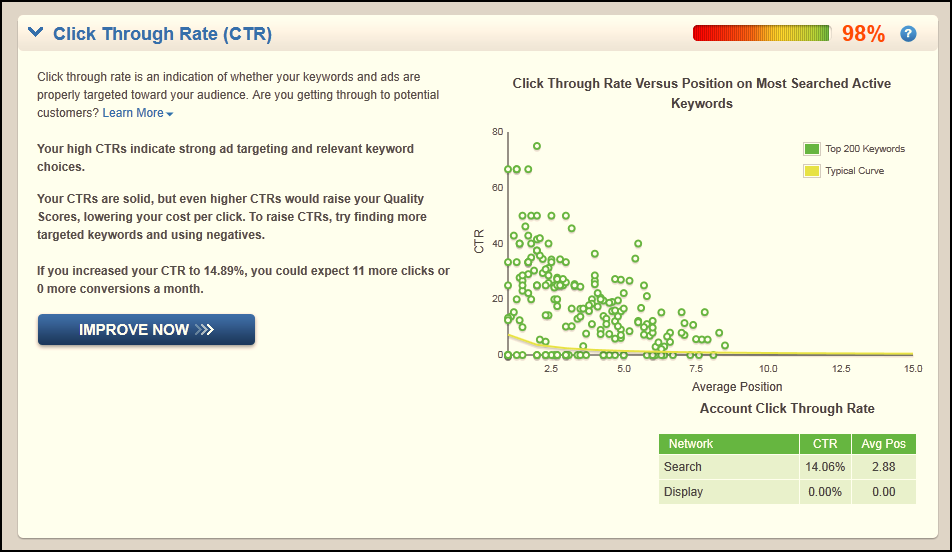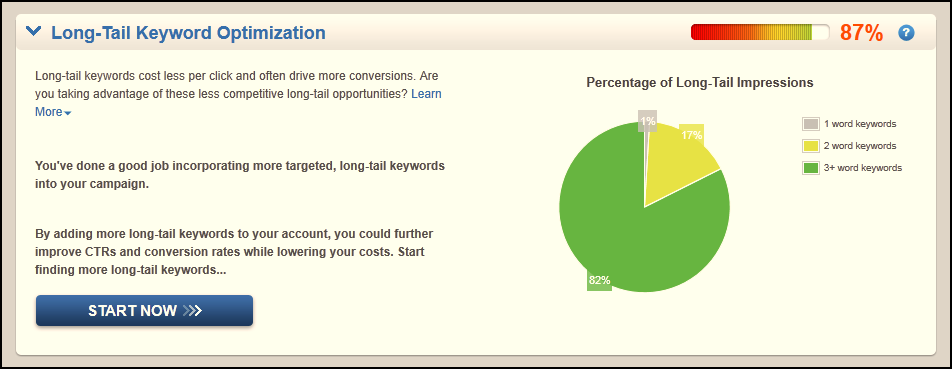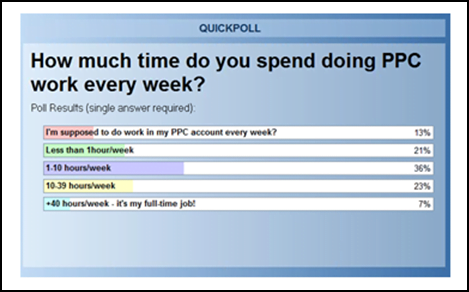
I’ve told you over and over that Quality Score is super important. It lowers your cost per click. It lowers your CPA. It improves your ad rankings. In short, high Quality Scores correlate really well with overall account success.
OK, OK, you’re saying, I get it! But how do I actually get these high Quality Scores? Rather than spout the usual list of advice, let’s take a close look at a real account that has exceptionally high Quality Scores and see how they’re getting it done.
The account we’re going to be looking at belongs to a WordStream client, a small business in the insurance industry. Despite this being one of the most competitive verticals in AdWords, this advertiser is killing it with his AdWords campaigns. In fact, he has an average impression-weighted Quality Score of 8.8 – about as close to “perfect” as I’ve ever seen. So how did they do it?
The 5 Key Characteristics of a High Quality Score Account
I used the AdWords Performance Grader to get some high-level insight into what this advertiser is doing so right. Using this report, I identified five key characteristics that are contributing to the super-high average QS of 8.8.
#1: Amazing Click-Through Rates
Theoretically there are a lot of factors that go into Google Quality Score. But the single most important factor is definitely normalized click-through rate (CTR). And this advertiser’s average CTR is off the charts:
That little yellow line represents the typical curve, with CTR plotted against average position. This account’s click-through rates are way, way higher than average – it’s got an average search CTR of 14.06% (2% is usually the benchmark for a decent PPC click-through rate). How did they get a 14% CTR in an average ad position of 2.88?
Most of the outlier keywords with CTRs of 30%, 40%, 50% and even 70% are branded keywords, which generally have very high CTRs — but the rest of the keywords aren’t branded. In fact, it’s interesting to note that there are even 0% CTR keywords that have perfect Quality Scores of 10. This suggests that the high account average CTR is pulling up the Quality Scores for all keywords in the account. I see this in a lot of accounts, and it’s one reason why I always recommend slating at least 15% of your PPC budget toward branded keywords. But what about the rest of the keywords in this account?
#2: Extensive Use of Long-Tail Keywords
Competitive keywords aren’t just hard to rank for in organic search; they’re tricky in PPC too, especially in cutthroat industries like insurance. So if you want high CTR’s you need to be a little pickier about your keyword selection. As you can see, this advertiser is in the 87th percentile in terms of long-tail keyword usage:
Long-tail keywords are generally more effective because they:
- Are more specific and better at pre-qualifying traffic
- Align more with the end of the purchasing funnel, so they convert at a higher rate
- Are less competitive and therefore cost less on a per-click basis
This advertiser is using mostly long-tail keywords – over 80% of the keywords include three words or more, and just 1% are one-word terms. This is likely a big part of why the average CTR and Quality Score are so high.
#3: Ongoing Ad Text Optimization
Along with choosing the right keywords, improving your CTR is all about ad optimization, using methods like A/B testing, dynamic keyword insertion and, more generally, ad copywriting techniques that clearly differentiate your offering from competitors.
One way to make sure your ads are highly targeted is to write more of them. Small business AdWords accounts often have too few text ads. Adding more ads gives you more opportunities to prove to searchers that you’ve got exactly what they’re looking for.
This advertiser has almost 100 active text ads, which is quite high for an account of this size. (The average, represented by the yellow bar, is more like 50.)
#4: Lots of Dedicated Account Activity
If any single lever is a better predictor of AdWords success than Quality Score, it’s account activity. Most small business accounts fail for the simple reason that the PPC manager doesn’t do enough work. They claim they’re in there doing work every week:
But the data tells a different story. In my experience:
- 1 in 5 AdWords account managers do nothing at all within a month.
- Only 10% of advertisers consistently do optimization work every week over a 90-day period.
This business is doing a much better job of regularly logging in and making improvements:
Looking at this account’s change history logs, we can see that the owner has done a lot in the past 30 days:
- Written 10 new text ads
- Added 164 keywords
- Created 4 new ad groups
This wasn’t just a one-time burst of activity – you can tell by the 90-day history that this advertiser consistently works to optimize the account. This is the key to high Quality Scores and ongoing results.
#5: Perfect Adherence to Best Practices
Topping everything else off, this business is following 100% of our top PPC best practices:
These eight best practices (stuff like using ad extensions and modified broad match) are pretty easy checkboxes to tick off, but many SMB accounts ignore them. In fact, only half of small businesses have conversion tracking turned on!
This business gets the thumbs up for all eight best practices. As a bonus, they’re also using plenty of negative keywords (important for cost reduction) and following landing page optimization best practices (landing pages can affect QS as well).
The Proof Is in the PPC Pudding
OK, so, this account looks great on paper. What are the actual benefits the business is seeing from such high Quality Scores?
This particular advertiser was previously spending around $1,000/month on PPC and is now spending about half that much. The company’s cost per click is roughly half the industry average, with an average CPA of approximately $12. Pretty baller, right?
If your Quality Scores aren’t this high (odds are they’re not), you can easily find out why. Grade your account for free and see where you’re falling short in these fives areas. Then get to work.
Hit me up on Twitter:












